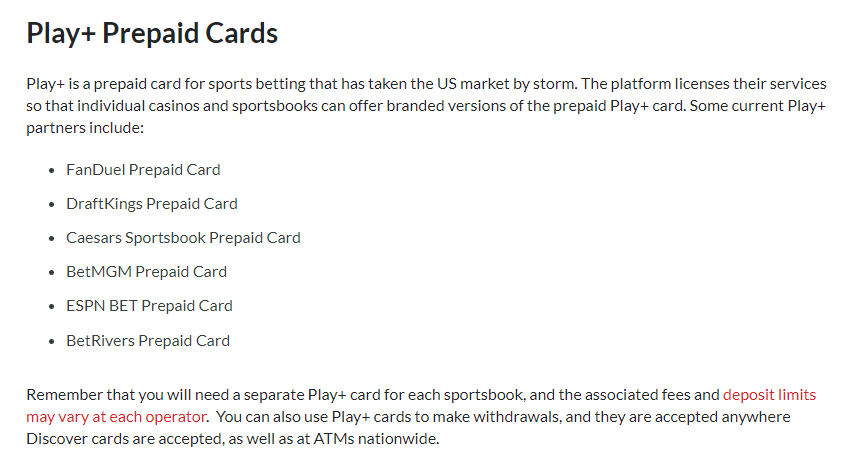The Sweepstakes War
After picking a fight with DFS 2.0, the licensed, regulated online gambling industry has decided to turn its attention to sweepstakes gambling sites.
The Bulletin Board
NEWS: Sweepstakes sites have begun to defend themselves against their critics.
BEYOND the HEADLINE: Are online casino advocates falling victim to one of Vizzini’s classic blunders?
NEWS: Examining the implications of GG Poker’s acquisition of the WSOP.
AROUND the WATERCOOLER: Colorado regulators offer a solution that creates more problems.
STRAY THOUGHTS: The fundamental difference between sharps and recs.
SPONSOR’S MESSAGE - Sporttrade was borne out of the belief that the golden age of sports betting has yet to come. Combining proprietary technology, thoughtful design, and capital markets expertise, our platform endeavors to modernize sports betting for a more equitable, responsible, and accessible future.
Sporttrade’s newest feature, The Tape, prints all trades made on the app in real-time.
The Industry Is Cranking Up the Heat on Sweepstakes
Begun the Sweepstakes War has.
DFS 2.0 has drifted into the background as the gambling lobby has set its sights on a new opponent: Sweepstakes.
“It’s time to pull the alarm bell on this one, folks,” Howard Glaser, Light & Wonder’s head of governmental affairs, recently said. “Lurking behind this mushy sounding term [‘sweepstakes casinos’] is a rapidly growing scheme of questionable legality which lets people play online casino games and wager real money – run by operators that skirt regulation and licensing, offer no player protections, and siphon revenue from state governments.”
Sweepstakes are just one of several products that fall into the seemingly bottomless pit of gray market gambling, which the legal industry is raising alarms about. That said, there is a glaring problem with some of the assertions, as the good actors in the sweepstakes space use the same safeguards as the licensed and regulated online casino industry.
Glaser is correct that they are largely unregulated and do not have to abide by the same responsible gambling rules and regulatory oversight that a licensed online casino site must abide by. Still, they do use the same geolocation technology and player verification as licensed operators. And considering the recent fiascos in the regulated market, I’m not sure AML deficiencies are a winning talking point.
A spokesman for Virtual Gaming Worlds (operators of Global Poker, Chumba Casino, and Luckyland Casino) refuted the AGA and Glaser’s claims, telling the Financial Review, “It had “best in class” financial crime controls and procedures including identification and verification processes for players and requirements for European Union anti-money laundering laws.”
“We entirely reject several of the AGA’s assertions,” the spokesman said. “We have full confidence in our compliance with all laws and regulations where we operate.”
Essentially, this may not be a road sweepstakes naysayers want to travel. Either the technology works, and sweepstakes sites are using it, or it doesn’t, which opens the proverbial Pandora’s Box. And you better have your own house in order if you’re going to complain about AML deficiencies.
In a subsequent LinkedIn post, Glaser noted the existence of pre-paid credit cards (something of an oxymoron), writing that, “Unlicensed, unregulated online casinos can issue Mastercards for playing online slots, blackjack and other table games???”
Glaser went on to say:
“Licensed casino transactions are regulated, tracked in minute detail (including source of funds at certain levels), subject to anti-money laundering procedures, under constant scrutiny by regulators. A Malta-based casino Mastercard? The very definition of money laundering: Exchange unsourced hard currency for an unregulated casino payout to the card which can then be used as laundered cash for “legit” purchases on the same card. Such as “drug money in, clean cash out”. May as well have a Mob branded card.”
Again, this is less about sweepstakes practices, as these prepaid cards — branded cards from Play+ — are widely available in the legal, regulated online gambling sector.
Here are available deposit options from the affiliate website Sports Betting Dime:
There was another bit of intrigue in the Finacial Review story, which noted the National Council on Problem Gambling also joined the fray, “pointing out that Light & Wonder also operated “social casino” sites.”
As I’ve mentioned, expect a very deep dive into this topic from me in the coming weeks.
Beyond the Headline: Are iCasino Advocates Barking Up the Wrong Tree?
Sticking with LinkedIn discourse, industry everything Chris Grove posted some thoughts that I would summarize as follows: The industry is frustrated by the lack of online casino legalization. This frustration causes it to point fingers at DFS and sweepstakes operators instead of looking in the mirror and retooling its messaging.
“Regrettably, our industry has not yet formulated a robust response to these and the numerous other negative narratives (whether justified or not) that are currently dominating the discourse,” Grove wrote. “Instead, leading advocates for online casino expansion seem obsessed with finger-pointing at games they simply don’t like. Not games that they even credibly claim are illegal, but that they simply don’t like.”
Grove rightly calls this a distraction that “mints new enemies for online casino bills” and leads to advocates using the same arguments against DFS and sweepstakes sites that legalization opponents use against the industry.
I couldn’t agree more. As I wrote in a feature column in March:
“Bill Burr has a bit about arguing with his wife and how when she’s right, she argues the point and nothing else, but when she realizes she’s wrong, she “goes rogue” and steers the conversation in different directions and away from the main point. The bit starts with him saying he has lost every argument, even when he’s right.
“Let’s face it: we (supporters of online gambling legalization) are Bill Burr. We’ve lost the plot.
“Like we did a decade ago when we let Sheldon Adelson choose the battleground and the rules of engagement, we are being distracted by red herrings and slippery slopes and falling victim to false dichotomies and strawman arguments… We need to stay on message. But first, we need a message.”
As I said in that column, “Supporters of legalization should always start from this simple premise: Online gambling is already widely available… whenever they go off-topic, we must bring them back to the starting point: Online gambling is already widely available.”
If anyone from the industry would like to discuss strategy in detail, feel free to email me at Steve@igamingpundit.com.
SPONSOR’S MESSAGE - Join 100s of operators automating their trading with OpticOdds.
Real-time data. Proven trading tools. Built by experts. Meet us at SBC Lisbon & G2E Vegas. Join top operators at www.opticodds.com.
3 Considerations Following the Sale of WSOP to GG Poker
With so much going on in the sector, GG Poker’s acquisition of the World Series of Poker hasn’t received the coverage it deserves — outside of poker circles.
There are several threads to explore following the $500 million acquisition:
The WSOP will, for the first time, be run by a poker-centric company.
GG Poker now has a path to enter the US, although a certain competitor is challenging the company’s suitability.
With online casino legalization stalled, could we see a renewed poker-only lobbying effort?
Daniel Negreanu brought up point #1 in an interview with Poker.org:
“One of the things that poker players can look forward to with GG taking over and being a poker-centric company [is that] Caesar's is no longer really involved in those big decisions from a marketing perspective, so we can get a lot more done.
“Those of you who came to the Bahamas last year got to look at the WSOP+ app. With this app, you basically have money in there, you go ‘boop boop boop’ on your phone, you get your seat card on your phone, you go right to your seat, no lines, no waiting, no anything. So obviously, seeing something like that at the World Series of Poker with the massive lines and things like that is going to be a real improvement to the player experience overall."
Pokerfuse.com’s Nick Jones (who has been all over this story) brought up point #2 in an X post:
“This isn't a first step towards GGPoker "launching in the United States." This is the step. This is the move. This licensing is to benefit GG. This ensures "WSOP" (which, upon deal completion, will be a wholly-owned GG brand) continues operation in the US.”
As I previously wrote, “Jones believes GG will license the WSOP brand back to Caesars, with Caesars eventually shifting from its current software (Evoke, nee 888) to GG Poker, thereby giving it a foothold in the market and solving GG’s market access issues.”
However, Flutter CEO Peter Jackson threw some cold water on the idea during the company’s Q2 earnings call, saying, “GG Poker operates in a lot of markets that we wouldn’t be prepared to operate in. So I think there are some interesting questions for some of those people involved.”
Finally, regarding legalization efforts, there is some movement toward poker-only strategies in New York (where online poker bills have been introduced), Maryland, and possibly Ohio.
As the Baltimore Sun editorial Board wrote:
“Our recommendation then is to go slowly and cautiously. Only a handful of states have legalized online casino gambling — including New Jersey, Delaware, Connecticut, Pennsylvania, Michigan, and West Virginia. One compromise might be, for example, to permit online poker games alone and then only with live dealers.”
Or, as Ohio Rep Bride Rose Sweeney said in a letter:
“The state could implement a limited pilot program and gauge its impact on Ohio’s market compared to neighboring states,” Rep. Bride Rose Sweeney, one of the committee members, wrote in a letter included in the report. “The state could legalize only one type of igaming, such as online poker, to test the waters while still chipping away at the illicit market.”
SPONSOR’S MESSAGE - Underdog: the most innovative company in sports gaming.
At Underdog we use our own tech stack to create the industry’s most popular games, designing products specifically for the American sports fan.
Join us as we build the future of sports gaming.
Visit: https://underdogfantasy.com/careers
Around the Watercooler
Social media conversations, rumors, and gossip.
Colorado gaming regulators have taken steps to prevent a repeat of the Jontay Porter scandal from earlier this year by restricting “negative” markets:
As Fair Play Initiative tweeted, “Don’t worry; you can still bet on a player to hit “Under 0.5 HRs”, just not “to a HR - No… In golf, “Player to Make or Miss Cut” is now disallowed, but would “Player to Tee Off in Round 3 Yes/No?” or “Player Score Over Cut Line Score” be more acceptable to CDG?”
“This is an example of regulation trying to solve a problem, but failing to do so while creating more problems,” professional bettor Rufus Peabody tweeted. “A better solution might be to not allow SGPs on correlated under props. But why should regulators be making these decisions?”
Stray Thoughts
Every stock purchase is made with the belief that it will increase in price, and every bet is placed with the intention of winning. The difference between a sharp, serious, and recreational gambler or investor is the amount of effort put into the decision.
People who put a lot of effort into their work will feel much differently when they are wrong than people who make little effort. They are also more likely to be heavily invested in that decision, risking a more meaningful amount of money (to them) than someone who is making willy-nilly decisions.








